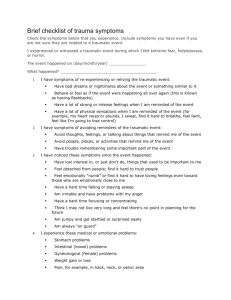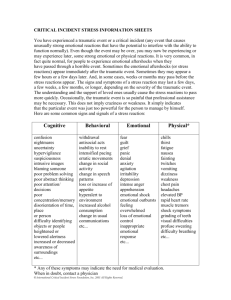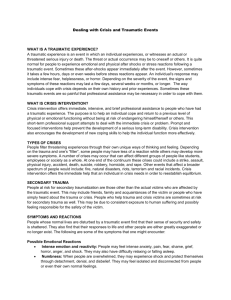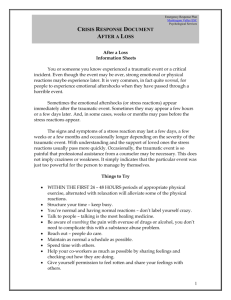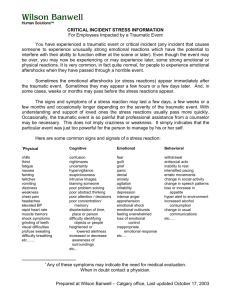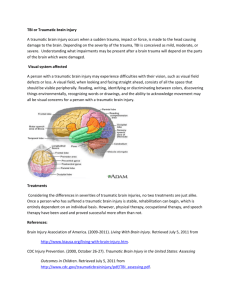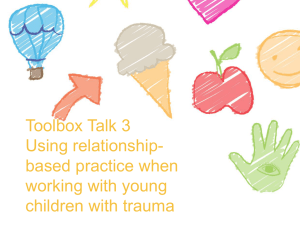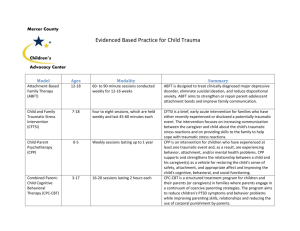Helping children cope with trauma
advertisement
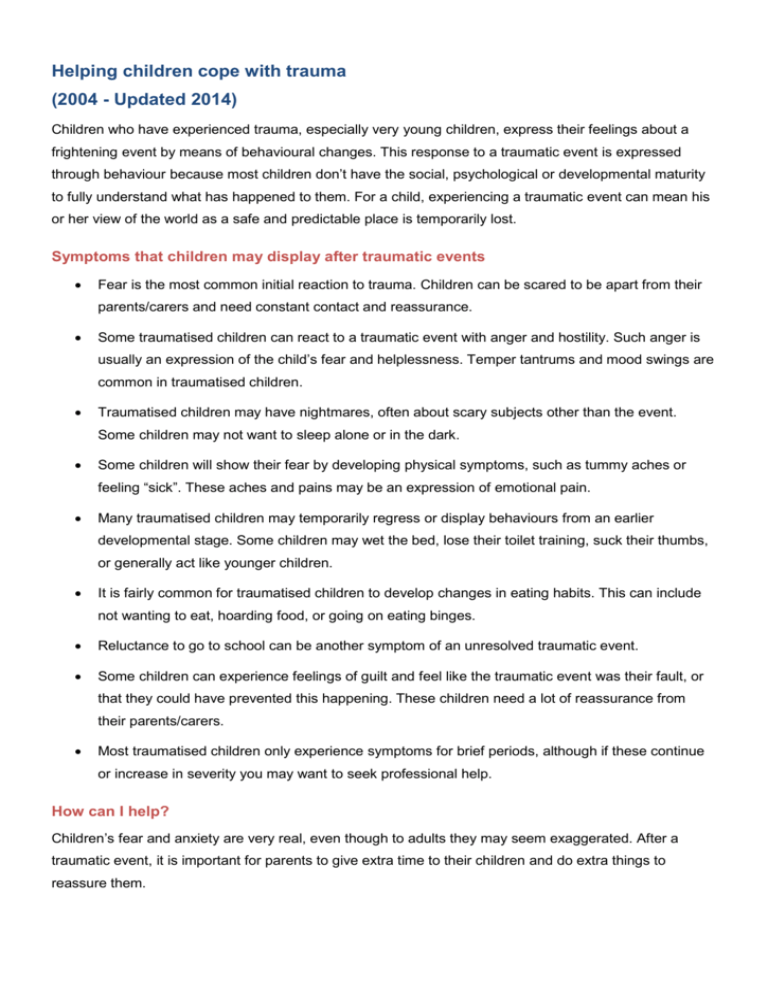
Helping children cope with trauma (2004 - Updated 2014) Children who have experienced trauma, especially very young children, express their feelings about a frightening event by means of behavioural changes. This response to a traumatic event is expressed through behaviour because most children don’t have the social, psychological or developmental maturity to fully understand what has happened to them. For a child, experiencing a traumatic event can mean his or her view of the world as a safe and predictable place is temporarily lost. Symptoms that children may display after traumatic events Fear is the most common initial reaction to trauma. Children can be scared to be apart from their parents/carers and need constant contact and reassurance. Some traumatised children can react to a traumatic event with anger and hostility. Such anger is usually an expression of the child’s fear and helplessness. Temper tantrums and mood swings are common in traumatised children. Traumatised children may have nightmares, often about scary subjects other than the event. Some children may not want to sleep alone or in the dark. Some children will show their fear by developing physical symptoms, such as tummy aches or feeling “sick”. These aches and pains may be an expression of emotional pain. Many traumatised children may temporarily regress or display behaviours from an earlier developmental stage. Some children may wet the bed, lose their toilet training, suck their thumbs, or generally act like younger children. It is fairly common for traumatised children to develop changes in eating habits. This can include not wanting to eat, hoarding food, or going on eating binges. Reluctance to go to school can be another symptom of an unresolved traumatic event. Some children can experience feelings of guilt and feel like the traumatic event was their fault, or that they could have prevented this happening. These children need a lot of reassurance from their parents/carers. Most traumatised children only experience symptoms for brief periods, although if these continue or increase in severity you may want to seek professional help. How can I help? Children’s fear and anxiety are very real, even though to adults they may seem exaggerated. After a traumatic event, it is important for parents to give extra time to their children and do extra things to reassure them. If a child is frightened or behaving differently, they should not be reprimanded or punished. It is also a good idea to take extra time to talk with your child to help them share their feelings about what has happened. Suggestions to help children cope with trauma Children of all ages can benefit from the family keeping their usual routine and making things as normal as possible. This can help a child feel more secure and safe. If possible children should stay with people they know and feel familiar with. Allow children to express their feelings and reactions in different ways. Each child may react differently to a traumatic event. Don’t be surprised if some children don’t seem affected by what they have seen, heard or experienced. Not everyone has immediate reactions; some have delayed reactions that might show up days, weeks or even months later, and some may never have a reaction. Your acceptance and understanding of this may make a difference to how your child recovers from trauma. Honestly express your own fears. If a child senses that you are secretly worried, they may also keep worries to themselves. However, by admitting your fears honestly, and showing that you can handle them, you send a message that they can overcome their fears also. Accept and allow for increased dependence. After an experience, children may become more dependent on you for personal time. Give more hugs if they need them or let them keep the light on at night. Try not to get annoyed or frustrated with clingy behaviour. Give honest, simple and brief answers to their questions. Try to use words and phrases that won’t confuse a child or make the world more frightening. If children are asking the same thing over and over again it is because they are trying to understand and trying to make sense out of the confusion in their world. When a child has experienced a traumatic event they may feel like they no longer have control of a situation. If they are given some element of control or choice in an activity or interaction they may feel more comfortable and safe. If a child is having difficulty with compliance, frame the consequence as a choice for them, for example “You have a choice; you can choose to do what I asked you or you can choose ...” This simple framing of the interaction with the child helps to give them some sense of control and can help defuse situations where the child feels out of control. Don’t forget to look after yourself. You may want to take ”time out” and ask a trusted family member or friend to help out for a while. When do I seek professional help? Sometimes it may be helpful for a child to see a counsellor who can provide a safe place to talk about what has happened and discuss their feelings. Getting professional help is a good idea if a child shows any of the following changes or is having prolonged symptoms: behaviourial or academic problems at school angry outbursts or temper tantrums withdrawal from usual social activities or playing with other children frequent nightmares or sleep disturbances physical problems such as nausea, headaches, weight gain or loss dangerous risk taking behaviour depression or sense of hopelessness, anxiety about life or the future. Ask for help if you have any questions These brief guidelines can only give you a broad framework for dealing with a traumatised child. The more informed you are the more you will be able to understand the child and to provide them with the support, guidance and care they need. Each community has agencies, organisations and individuals coping with the same issues. They often have the support you may need. Victims Access Line (VAL) You can call the VAL (8pm and 6pm, Mon to Fri) for information about your rights as a victim of crime, how to access counselling and financial assistance and help with completing victim impact statements. The Support Coordination Team can provide confidential emotional support and crisis counselling, help in identifying your needs, and referrals to other groups and services that may assist you in your recovery. Contact details Phone: 1800 633 063 Sydney metropolitan area: (02) 8688 5511 Aboriginal Contact Line: 1800 019 123 Hours: 8am to 6pm, Mon to Fri Fax: (02) 8688 9632 Email: vs@justice.nsw.gov.au Website: www.victimsservices.justice.nsw.gov.au Street address: Level 1, Justice Precinct Offices, 160 Marsden Street, Parramatta Address all mail to: The Commissioner of Victims Rights, Victims Services. Locked Bag 5118 Parramatta NSW 2124 Other places of support Local Community Services Association Phone: (02) 9660 2044 Website: www.lcsansw.org.au Provides information about your closest neighbourhood/community centre in your area of residence. NSW Family Services Phone: (02) 9692 9999 Website: www.nswfamilyservices.asn.au Provides a search function by suburb of all family services in your area. UNIFAM Counselling for Adolescents & Parents Phone (Head office): (02) 8830 0777 Phone: www.unifamcounselling.org Lifeline Phone: 13 11 14 Website: www.lifeline.org.au Parent Line Phone: 1300 30 1300 Phone: www.parentline.com.au Kids Helpline Phone: 1800 55 1800 Phone: www.kidshelp.com.au
